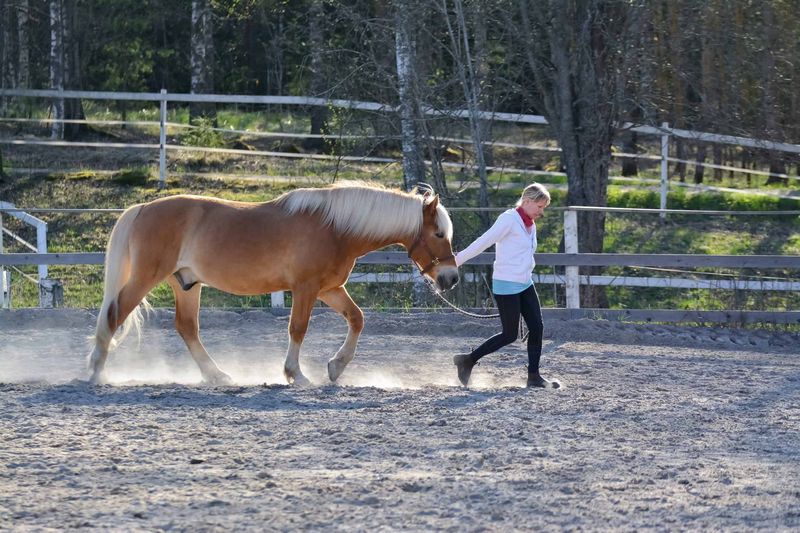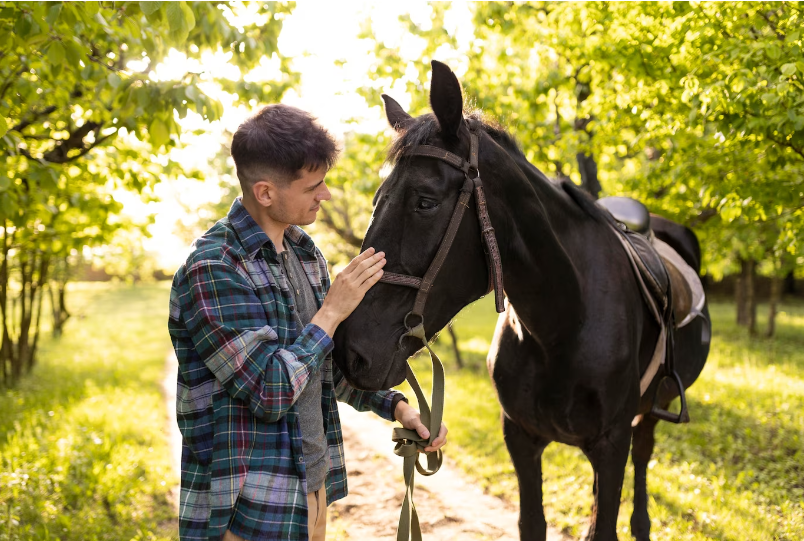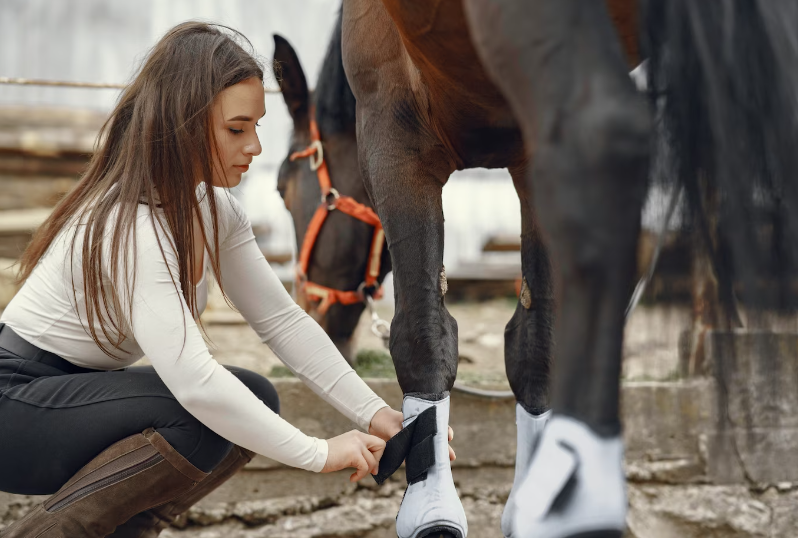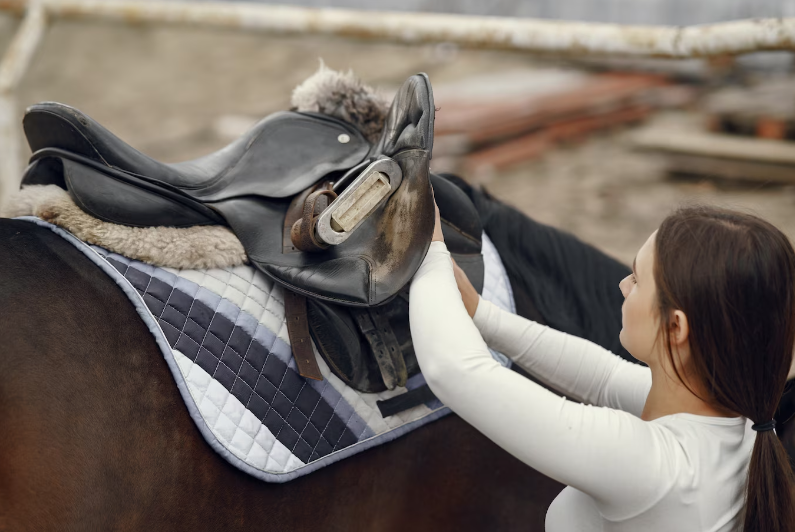The Bond between Horses and Humans: Exploring the Remarkable Memory and Recognition Abilities of Equines

Humans have always sought to understand the intricate workings of the animal kingdom. Whether it’s studying their behavior, deciphering their communication, or unlocking the secrets of their memory, the quest for understanding is endless. One fascinating aspect of this exploration is how horses remember and recognize their humans, and the deep bond that can be formed between these magnificent creatures and the humans who care for them.
Building trust between a human and a horse is a delicate process that requires time, patience, and a mutual understanding. Horses are incredibly perceptive animals, capable of recognizing individual humans by their scent, voice, and body language. This remarkable ability to remember and differentiate between humans allows horses to establish a unique bond with their caretakers.
Remembering humans goes beyond simple recognition. Horses have an innate ability to remember past interactions, both positive and negative. The memory of a gentle touch, soft words, and a harmonious partnership can be etched into a horse’s mind, leading to a deep trust and a strong emotional connection. Similarly, a negative experience can leave a lasting impression, causing fear, anxiety, and subsequent difficulty in building trust.
Understanding and respecting a horse’s memory and recognition of humans is crucial in building a trusting relationship. It requires consistency in our actions, communication, and treatment of these majestic creatures. By showing kindness, patience, and understanding, humans can foster a bond with their horses that transcends words and creates a deep and lasting connection.
Content:
Importance of Trust in Horse-Human Relationship
Horses are highly intelligent and sensitive animals that possess a remarkable ability to remember and recognize their humans. Understanding this unique trait is crucial when it comes to building a strong and meaningful relationship between humans and horses.
Trust plays a fundamental role in this relationship. Horses, like humans, rely on trust to feel safe and secure. When a horse trusts its human, it feels comfortable and confident in their presence. This trust forms the foundation for effective communication and cooperation.
Building trust with a horse requires time, patience, and consistency. A horse will remember both positive and negative experiences with humans, shaping its perception and trust level. By consistently demonstrating kindness, respect, and fair treatment, humans can earn a horse’s trust and strengthen the bond between them.
Trust also enables horses to have better understanding and cooperation with their humans. When a horse trusts its human, it can better comprehend and respond to their cues and commands. This understanding is crucial for various activities, such as riding, training, and competing.
Moreover, trust allows horses to feel comfortable in new environments and situations. By trusting their humans, horses can overcome fears and anxieties, leading to better performance and overall well-being. Trust also helps horses to adapt to changes and challenges more easily, as they have confidence in their humans to guide them.
In conclusion, trust is of utmost importance in the horse-human relationship. By understanding the significance of trust and working towards building it, humans can develop a strong and harmonious bond with horses. Trust not only enhances communication and cooperation but also allows horses to feel safe, secure, and understood by their humans.
Developing a Strong Bond
Building trust and understanding is crucial in developing a strong bond between horses and humans. Horses have an exceptional memory and can remember their human counterparts for years. They can recognize their owners by their scent, voice, and even their body language.
Humans can foster and strengthen this bond by spending quality time with horses and consistently providing them with care and attention. By being calm, patient, and consistent in their interactions, humans can create a safe and secure environment for horses, allowing them to feel comfortable and develop trust.
Trust Remembering Building Understanding
| Horses rely on a strong sense of trust in their relationships with humans. Trust is built over time through consistent and reliable interactions. | Horses have a remarkable memory and can remember humans they have had positive experiences with. They can recall the way they were treated and respond accordingly. | Building a bond with a horse requires consistent effort and attention. Regular grooming, feeding, and exercising provide an opportunity for humans to build trust and understanding with their equine companions. | Understanding the natural behaviors and communication cues of horses is essential for humans to develop a strong bond. Recognizing and responding to a horse’s body language allows for effective communication and a deeper understanding of the horse’s needs and emotions. |
Maintaining a strong bond with a horse requires ongoing effort and commitment from both the human and the horse. Regular interaction, training, and positive reinforcement can further strengthen the bond and enhance the relationship between horses and humans.
Mutual Respect and Communication
Trust is the foundation of any relationship, whether it is between humans or horses. Building trust with a horse takes time and patience, but it is essential for a deep and meaningful connection. Horses are incredibly perceptive animals and can recognize and remember the humans they have encountered before.
Understanding the horse’s unique way of communication is crucial in establishing mutual respect. Horses communicate through body language, facial expressions, and vocalizations. Learning to interpret these signals can help humans communicate more effectively with their equine partners.
Building trust with a horse begins with establishing a consistent and clear communication system. This includes using gentle cues and rewards to indicate the desired behavior. Praising and rewarding a horse when they respond correctly helps create a positive association and reinforces trust.
Consistency is key in building trust. Horses need to know what to expect from their humans, so it is important to be consistent in handling, training, and riding techniques. By providing a predictable environment, humans can help horses feel safe and secure.
Understanding the reasons behind a horse’s behavior can also contribute to the development of trust. Horses may act out due to fear, pain, or past negative experiences. Taking the time to understand and address these issues can help horse and human develop a stronger bond.
In conclusion, mutual respect and communication are essential in building trust between humans and horses. By understanding and responding to the horse’s unique way of communication and consistently providing a safe and predictable environment, humans can establish a deep and meaningful connection with their equine partners.
The Role of Memory in Horse-Human Interactions
Horses are remarkable animals known for their ability to build trust and understanding with humans. A crucial aspect of this bond is the horse’s ability to recognize and remember their human counterparts.
Memory plays a fundamental role in horse-human interactions. Through their superior memory capabilities, horses can remember individuals they have encountered before, forming a recognition that fosters a sense of familiarity and trust.
When a horse recognizes and remembers their human, they are more likely to display positive behaviors and feel at ease in their presence. This recognition allows for a deeper level of understanding between horse and human, facilitating effective communication and cooperation.
Horses remember humans through a combination of visual, auditory, and olfactory cues. They can recognize familiar faces and voices, associating them with positive experiences or negative ones, depending on the interactions they have had previously.
Furthermore, horses have the ability to remember specific interactions and experiences with humans. For example, they can recall training sessions, competitions, or even moments of affection. These memories contribute to their overall understanding of their human counterparts and the trust they develop over time.
It is important for horse owners and handlers to be aware of the role of memory in horse-human interactions. By understanding the horse’s memory capabilities and utilizing effective training techniques, humans can build stronger bonds with their equine companions and create a positive and trusting relationship.
Long-Term Memory and Recognition
In building trust and understanding between horses and humans, it is important to recognize and understand how horses remember and recognize their humans.
Horses have excellent long-term memory, capable of remembering humans they have interacted with for years. This memory is often linked to the emotional response a horse associates with a particular individual. Through positive experiences and consistent handling, horses can develop trust and recognize their humans.
Recognition is not solely based on physical appearance but also on the energy and body language humans emit. Horses are highly perceptive creatures and can pick up on subtle cues that indicate a familiar person. They may remember the touch, voice, or scent of a person and associate it with positive or negative experiences.
Consistency is key in building trust and reinforcing recognition. Regular interactions, consistent handling, and positive reinforcement can strengthen the bond between a horse and its human. By establishing a routine and providing a safe and comfortable environment, humans can help horses feel secure and develop a sense of familiarity.
Understanding how horses remember and recognize their humans is crucial for developing a strong and trusting relationship. By acknowledging the importance of long-term memory and recognizing the unique sensitivities of horses, humans can create a foundation of trust and understanding that will benefit both parties.
Associative Learning and Conditioning
Building trust and understanding between horses and humans is crucial for a harmonious relationship. Horses have the remarkable ability to remember and recognize their humans, which is rooted in their capacity for associative learning and conditioning.
Associative learning is the process by which horses make connections between specific stimuli and a particular outcome or response. For example, through positive reinforcement, such as praise or treats, horses learn to associate specific behaviors with rewards. This type of learning helps horses understand what behavior is desired and encourages them to repeat it in order to receive the positive reinforcement.
Conditioning is another aspect of associative learning that plays a role in how horses remember and recognize their humans. Through classical conditioning, horses can associate certain cues, such as a specific voice tone or body language, with a particular outcome. This means that horses can learn to recognize their humans based on the cues that they have learned to associate with positive experiences.
Trust and understanding between horses and humans can be further built through associative learning and conditioning. By consistently providing positive reinforcement and using consistent cues, humans can create a reliable and predictable environment for horses. This helps horses feel comfortable and secure, leading to a stronger bond and enhanced trust.
In conclusion, horses have a remarkable ability to remember and recognize their humans due to their capacity for associative learning and conditioning. By understanding and utilizing these learning processes, humans can build trust and create a deeper understanding with their equine companions.
Familiarity and Recognition in Horses
Building trust and understanding between humans and horses is crucial for creating a strong bond. One way horses remember and recognize their humans is through familiarity.
Horses have a remarkable ability to remember people they have interacted with before. They can remember not only the faces but also the body language and scent of their human companions. This recognition is built over time, as horses are exposed to consistent interactions with their humans.
Trust plays a vital role in this process. When horses feel safe and comfortable around their humans, they are more likely to remember and recognize them. Trust is cultivated through positive experiences and consistent care, allowing horses to form a bond with their human partners.
Recognition goes beyond physical attributes. Horses can also recognize the voice and tone of their humans. They pay attention to the way their humans communicate with them, whether it is through verbal cues or subtle body language. This level of recognition allows for a deeper understanding between humans and horses, enabling effective communication and teamwork.
Remembering and recognizing their humans is essential for horses as it contributes to their overall well-being. When horses feel familiar and comfortable with their humans, they are more likely to be responsive, cooperative, and less stressed. The bond that is built through familiarity and recognition promotes a harmonious relationship between humans and horses, enhancing their mutual trust and understanding.
Recognizing Familiar Humans
Trust and understanding are vital components in building a strong bond between humans and horses. Horses have an incredible ability to recognize and remember familiar humans, which plays a crucial role in developing a deep and lasting connection.
Through consistent interactions, horses learn to recognize specific features and mannerisms of the humans they frequently interact with. They can identify individuals by sight, recognizing their faces, body language, and even the sound of their voice.
Research has shown that horses have a highly developed memory for humans, often remembering individuals they haven’t seen in years. This recognition is not limited to visual cues alone. Horses can also remember humans based on other sensory information, such as scent and touch.
Recognizing familiar humans is not only important for establishing a sense of trust, but it also allows horses to feel more comfortable and secure in their interactions. When a horse recognizes a familiar human, they are more likely to approach them willingly, seek their attention, and cooperate in various activities.
Furthermore, the ability to recognize familiar humans enables horses to differentiate between trustworthy individuals and potential threats. Horses have a keen sense of intuition, and they can pick up on subtle cues that may indicate a person’s intentions. This ability to discern familiar humans from strangers helps horses feel safe and protected.
Building trust and understanding between humans and horses requires consistent and positive interactions over time. By recognizing familiar humans, horses establish a foundation of trust, which allows for deeper connections and greater mutual understanding.
Remembering Familiar Environments
In addition to remembering familiar humans, horses also have a remarkable ability to recognize and remember familiar environments. They can develop a strong sense of trust and understanding in places they are familiar with, just as they do with humans.
Research has shown that horses can remember specific locations and navigate their way back to them even after long periods of time. They use visual cues, landmarks, and their own internal map to guide them back to places they have been before. This ability to remember familiar environments is not only useful for horses in their natural habitats, but it also has practical implications for horse training and handling.
When a horse is introduced to a new environment, it may take some time for them to become comfortable and familiar with their new surroundings. They rely on their memory and recognition skills to understand and navigate this new environment. By gradually introducing a horse to new environments and allowing them time to explore and adjust, trainers and owners can help build trust and understanding between horses and their new surroundings.
Understanding how horses remember and recognize familiar environments can also help trainers and owners create safe and supportive environments for their horses. By providing consistency and stability in their surroundings, horses can feel more secure and develop stronger bonds with their handlers.
Overall, horses have a remarkable ability to remember and recognize familiar environments. This ability plays a crucial role in their trust and understanding of the world around them, including the humans they interact with. By understanding and respecting the way horses remember and navigate their surroundings, we can build stronger relationships and create a more harmonious environment for these magnificent animals.
The Influence of Scent and Voice
Horses have an incredible ability to remember and recognize their humans. Building trust and understanding between humans and horses is crucial in any horse-human relationship.
One of the ways horses remember their humans is through scent. Horses have a highly developed sense of smell and can easily recognize the unique scent of their human. This is why it is important for humans to wear the same scent, such as a certain type of perfume or cologne, when interacting with their horse. The familiar scent helps the horse remember and establish a sense of trust.
Another important factor in horse-human relationship is the influence of voice. Horses can remember the voices of their humans and can distinguish between different tones of voice. For example, a horse may respond differently to a calm and soothing voice compared to a loud and aggressive voice. By using a consistent and gentle voice, humans can build a bond of trust and understanding with their horse.
Overall, scent and voice play a significant role in how horses remember and recognize their humans. By using the same scent and maintaining a consistent and gentle voice, humans can establish trust and build a strong bond with their horse.
Unique Human Scent
Horses have a unique ability to recognize and remember humans through their sense of smell. They are able to distinguish between different individuals based on their scent alone. This ability plays a crucial role in building trust and understanding between horses and humans.
The sense of smell is highly developed in horses. They have a large number of olfactory receptors, which enable them to detect and identify a wide range of smells. Horses use their sense of smell to navigate their environment, identify food sources, and detect predators.
When it comes to recognizing humans, horses rely on their keen sense of smell to differentiate between different individuals. Each person has a unique scent, which is influenced by factors such as diet, hygiene, and even emotions. Horses are able to pick up on these subtle differences and associate them with specific individuals.
Once a horse has become familiar with a particular human’s scent, they can remember and recognize them even after long periods of separation. This is why horses are often able to form deep bonds with their riders or caretakers. The familiarity of the human scent provides a sense of security and comfort for the horse.
Building a strong relationship with a horse involves not only building trust through consistent handling and positive experiences but also establishing a positive and recognizable scent. Taking care of personal hygiene and maintaining a consistent routine can help horses become more familiar with an individual’s scent.
In conclusion, horses have a remarkable ability to remember and recognize humans through their unique sense of smell. This ability is essential for building trust and understanding between horses and humans and plays a crucial role in establishing strong and lasting relationships.
Recognizing Human Voice
Horses have a remarkable understanding and memory when it comes to recognizing human voices. They can remember and recognize the voices of their humans, which helps to build trust and form a strong bond between horses and humans.
Research has shown that horses are able to distinguish between different human voices, even if they sound similar. They can recognize the voice of their handler or owner, and they can differentiate it from the voices of other people.
This ability to recognize human voices is not only based on the sound, but also on the associated emotions and experiences. Horses are very perceptive animals, and they can pick up on the subtlest changes in our tone of voice and body language. They can sense our emotions and understand our intentions.
By recognizing their humans’ voices, horses can feel more comfortable and secure. They can trust their handler or owner, knowing that they are familiar and safe. This recognition also helps horses to remember training cues and commands, as they can associate the voice with specific actions or behaviors.
Building a strong bond with a horse involves more than just spending time together. It requires understanding and communication, and recognizing the human voice is an important part of that process. Through this recognition, horses can feel connected to their humans and develop a deep level of trust and understanding.
Emotional Bonding and Trust Building
As social animals, horses have the ability to form strong emotional bonds with humans. This emotional bonding is essential for building trust and understanding between humans and horses.
Horses have the remarkable ability to recognize humans and remember previous interactions. They can remember a person’s voice, scent, and body language, which helps them in recognizing and distinguishing different individuals. This recognition and memory play a crucial role in building trust between horses and humans.
In order to build an emotional bond with a horse, it is important for humans to consistently exhibit positive and consistent behavior. Horses are perceptive animals that can sense and interpret human emotions. By being calm, patient, and respectful, humans can create an environment of trust and understanding.
Trust is a key component in any relationship, including the one between humans and horses. By consistently showing trust towards horses, humans can encourage horses to reciprocate that trust. This trust-building process involves understanding the horse’s needs, desires, and boundaries.
Building trust and understanding takes time and effort. It requires consistent positive interactions, clear communication, and respect for the horse’s individuality. As the bond between humans and horses grows stronger, so does the trust and understanding between them.
Building Trust through Positive Experiences
In order for horses to remember and recognize their humans, a foundation of trust and understanding must be established. One of the most effective ways to achieve this is through building positive experiences with the horse.
Horses have remarkable memories and can recall past interactions with humans. Positive experiences create a lasting impression on the horse, fostering a sense of trust and familiarity. These experiences can include gentle grooming sessions, rewarding treats, and engaging in activities that the horse enjoys.
By consistently providing positive experiences, humans can demonstrate their reliability and create a bond with the horse. Horses are highly perceptive and can sense the intentions and emotions of those around them. When a horse associates humans with positive experiences, they feel safe and comfortable in their presence.
Building trust through positive experiences also involves understanding and respecting the horse’s boundaries and communication cues. Horses have their unique ways of expressing themselves and it is important to listen and respond appropriately. This level of understanding can be developed over time through patient and consistent interaction.
Through building trust and understanding with their humans, horses can form deep connections and become more willing partners. These positive experiences not only benefit the horse but also enhance the overall relationship between humans and horses.
Question-answer:
How do horses remember and recognize their humans?
Horses have excellent memories and can remember humans based on their scent, voice, and body language. Once they have formed a bond with a human, they can recognize them even after long periods of separation.
What are some ways that horses show recognition towards their humans?
Horses may show recognition towards their humans by nuzzling them, following them around, and being more relaxed and content in their presence. They may also respond more positively to their commands and cues.
Do horses remember past interactions with humans?
Yes, horses have a remarkable ability to remember past interactions with humans. They can remember positive and negative experiences, and these memories can shape their behavior and trust levels towards humans in the future.
Can a horse forget a human they were once familiar with?
While it is rare, a horse can forget a human they were once familiar with, especially if they have had little to no contact with that person for an extended period of time. However, in most cases, horses have long-lasting memories and can recognize humans they were once bonded with.


